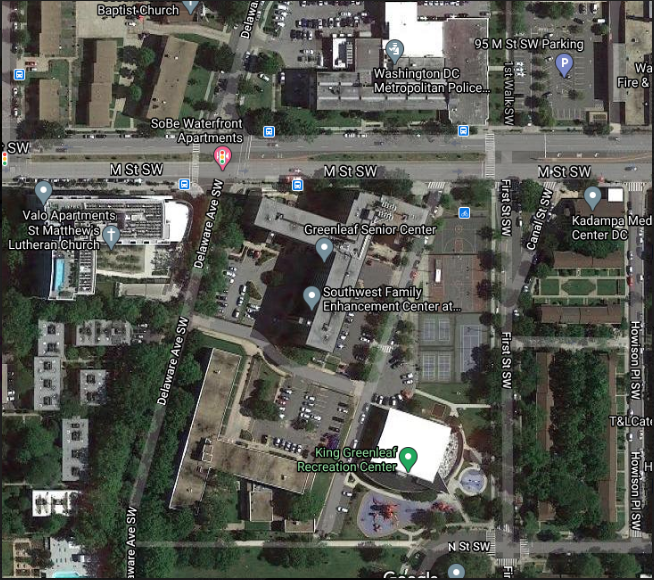By Dena Walker

A long time in the making, a “build first” redevelopment of Greenleaf inches forward; Courtesy of Google Maps
Southwest is unique in so many ways, and I often refer to our little quadrant of Washington, D.C. as “a city, within a city,” when describing its location to people who have never visited the District. It is a corner of the city that is rich in diversity, history, and, especially, change. There are many changes occurring in this community, as seen by the development of plots of land that remained vacant for many years. The numerous cranes in the sky punctuate the reality that only change is constant.
This change will inevitably apply to land currently occupied by residents of the three Greenleaf communities that include Greenleaf Gardens Extension and Additions, Greenleaf Senior, and Greenleaf Mid-Rise Family. These are properties positioned in the housing portfolio of the District of Columbia’s Housing Authority (DCHA) and are slated for redevelopment.
On Nov. 13, 2020, the DCHA’s Board of Commissioners voted to pass resolution 20-20, which authorized Mr. Tyrone Garrett, executive director of the DCHA to begin negotiations with Pennrose, EYA and Bozzuto, the development team for the proposed Greenleaf redevelopment project. Passing this resolution began the process for a redevelopment that’s spent years in the rumor mill. In a peculiar way, it is almost a sigh of relief that the unknown is about to become known.
The many buildings that comprise the Greenleaf properties were constructed in the late 1950’s, and are falling deeper into such disrepair that living conditions for residents have been described as “deplorable.” It is not difficult to understand the financial position of the DCHA to decide to redevelop the properties rather than repair them. When asked why the Housing Authority does not take the route of rehabbing the units, instead of redevelopment, DCHA responded that repairing these units would cost more than the agency can afford to rehabilitate. For the DCHA, their solution to Greenleaf residents living in deplorable conditions is to redevelop all the properties, which includes a written commitment from the DCHA to replace all 493 units currently situated on the Greenleaf properties.
I must also mention that Greenleaf sits on prime real estate, and with that comes the contentious reality that most redevelopments of low-income housing are constructed after the market rate units are supplied. For this reason, former residents of DCHA’s redeveloped properties cannot return to the redeveloped property. Many times, a proposed redevelopment of public housing is never completed. Such properties sit vacant for years while the need for housing grows, and not just for residents of public housing, but for anyone whose income never reaches levels that afford them the choice to live where they want.
Residents of public housing redevelopments are told they must temporarily move prior to the redevelopment, and are very often given empty promises of returning after redevelopment is finished. Such false promises lead many residents to believe that their temporary displacement will be rewarded with a new shiny residence in a new thriving community once the redevelopment of their former home is complete.
Residents of Greenleaf have been assured by the DCHA that its commitment to “Build First” is one of the primary principles of this redevelopment project. Perhaps I am speaking too soon, but I believe that Mr. Garrett, along with the selected co-developer, understands and respects that transparency and the essential input of Greenleaf residents comes first. This redevelopment is an expansive project – likely to be completed several years from now. In the meantime, the entire Greenleaf redevelopment process will be under a microscope, and I am sure the DCHA and the co-developer want to make sure this project is successful. I am also hopeful that this redevelopment project will become a case study on how public housing authorities can deliver mixed-income communities in a manner that is equitable and beneficial to the public housing residents it impacts.
Regardless of whether this project comes to fruition or not, the resident leadership of Greenleaf Gardens will continue its mission to help enhance the lives of residents. Although the COVID-19 health crisis halted in-person resident council meetings, programs, and activities, it created a unique opportunity for the resident leadership to communicate more frequently with residents via online and virtual platforms.
Furthermore, the Greenleaf Gardens Homework Assistance Program continues to support our students by assisting with homework assignments via telephone and virtually. Our 2019 Greenleaf Summer of Science, Technology, Engineering, Arts, and Math (STEAM) was so successful that we had a waiting list for students who resided in various parts of our city. We continue to build upon the success of that program by offering resident programs and opportunities that can enhance their educational and career abilities.
I strongly believe that preparation is key to any endeavor for which a person is eager to achieve positive outcomes.
With that said, the resident leadership in partnership with a local cyber security firm will begin our virtual business and technology classes at the beginning of next year to prepare any residents seeking a career with the skills and knowledge to confidently perform in the workplace. This program began in 2015 with in-person classes at the Greenleaf Gardens Resident Council Office and has operated every year since then. The proposed redevelopment of Greenleaf will undoubtedly leave many, especially the residents and students it impacts, with more questions than answers that are not easily answered at this time.
The passing of resolution 20-20, however, is just the first step of many. Resident input is one of the guiding principles of the redevelopment, and it will be followed prior to any red brick being knocked down on any Greenleaf property. To quote myself over six years ago at a redevelopment planning meeting, “Greenleaf residents, do not fear this process. This proposed redevelopment will not be done to us, but with us.”

